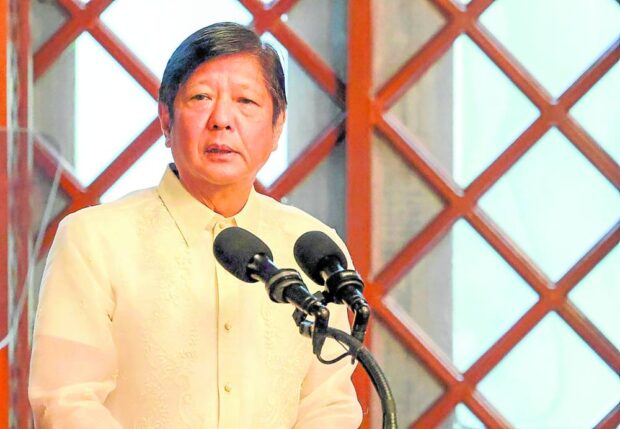Bongbong Marcos: ‘That’s it; we’re done talking with ICC’

President Ferdinand Marcos Jr. —KJ ROSALES/PPA POOL
President Ferdinand Marcos Jr. on Friday said his administration would end further engagement with the International Criminal Court (ICC) after it rejected the Philippine government’s appeal to stop the ICC prosecutor’s investigation of crimes against humanity allegedly committed by his predecessor in the drug war.
“That’s it. We have no appeals pending. We have no more actions being taken. So, I suppose that puts an end to our dealings with the ICC,” the President told reporters on the sidelines of the inauguration of a road project in Zamboanga Sibugay.
“We’re done talking with the ICC. Like what we have been saying from the beginning, we will not cooperate with them in any way, shape, or form,” he added.
Intrusion and threat
The drug war was a centerpiece program of former President Rodrigo Duterte that ran through his entire six-year term and was marked by thousands of killings by police of suspected drug offenders, mostly from poor communities.
By the time Duterte stepped down in June 2022, more than 6,000 deaths were officially acknowledged by the government in the antinarcotics campaign. Human rights groups say the number could be closer to 30,000 and most were extrajudicial killings allegedly encouraged by Duterte.
Mr. Marcos, who earlier said that an ICC probe would be “an intrusion into our internal matters and a threat to our sovereignty,” said that the ICC had no jurisdiction over the Philippines.
“So, we continue to defend the sovereignty of the Philippines and continue to question the jurisdiction of the ICC and their investigations here in the Philippines,” he said.
According to Mr. Marcos, the alleged crimes linked to Duterte’s bloody war on drugs were committed in the Philippines and should therefore be investigated by local authorities.
“They are talking about Filipinos. Their alleged crimes are here in the Philippines. The victims are Filipinos. Why should it be [investigated] in The Hague? It should be here,” he added.
A day earlier, Solicitor General Menardo Guevarra said Mr. Marcos had agreed to “full disengagement” with the ICC.
On Tuesday, the Appeals Chamber of the ICC voted 3-2 to junk the Philippine government’s appeal to stop its prosecutor’s investigation of Duterte and other officials who allegedly committed crimes against humanity in the war on drugs.
It affirmed its decision in January this year to authorize the resumption of the probe into the drug war due to the Philippine government’s supposed lack of willingness or inability to show substantial efforts to investigate drug war crimes.
One of the bases of the government’s appeal is the principle of complementarity which respects a state’s primary role in conducting investigations and prosecution of a suspected violator of international humanitarian law. Filipino officials have insisted that the Philippines has a working and independent judicial system that has no need for outside interference or assistance.
Treaty withdrawal
Another argument raised by the Philippines to oppose the ICC prosecutor’s probe is the withdrawal of the Philippines from the Rome Statute, the treaty which established the ICC, in 2018 after the ICC prosecutor then opened a preliminary examination of Duterte’s drug war. The withdrawal took effect on March 17, 2019.
Justice Secretary Jesus Crispin Remulla said no representative will be sent to the international tribunal’s proceedings.
“We’re done and we’ve nothing to talk about,” Remulla said at a press briefing on Friday. “Everything comes to an end, especially relationships that are not doing us any good if they won’t respect our sovereignty.”
He said, however, that “we don’t want to be a snob and look bad to other countries that just want to talk.”
“But if they intend to interfere with the way we do things then that’s completely unacceptable,” Remulla said.
Still keep tabs
Sen. Francis Tolentino, chair of the Senate justice and human rights committee, said the Office of the Solicitor General (OSG) should still keep tabs on the ICC proceedings.
“If the investigation would proceed, I think it would be wise for the (OSG) to have a listening (post) and monitor what is happening because our disengagement would really not mean a total lack of communication,” he said in a radio interview.
Boycotting the ICC altogether would be a “disadvantage” to the government, considering that two of the five judges agreed with the Philippine position that the tribunal doesn’t have jurisdiction over the country anymore, according to international law professor Roel Bagares of the Polytechnic University of the Philippines.
“The Philippines actually has this opportunity and if they disengaged fully, they will have lost that opportunity,” Bagares told the Inquirer. Domingo Cayosa, former president of the Integrated Bar of the Philippines, said the “split decision” showed the ICC as a “neutral tribunal, no biases, no politics because the reality is if you look at the judges, they come from different countries.”
The ICC’s investigation is already an “international embarrasment” for the country since the tribunal reflects the view of the international community that the government is “unable or unwilling to investigate, prosecute and punish perpetrators” of thousands of killings in the drug war, he said.
The lawyers for families of the drug war victims said they preferred the government’s participation.
“If they don’t want to participate then it’s their problem, but we would want them to so we can fully thresh out the issues and not just win by default because your opponent gave up,” said Kristina Conti, counsel for the families.
—WITH A REPORT FROM MARLON RAMOS
RELATED STORY:
Bongbong Marcos holds firm vs ICC probe: It’s over. We’ll not cooperate in any way
Subscribe to INQUIRER PLUS to get access to The Philippine Daily Inquirer & other 70+ titles, share up to 5 gadgets, listen to the news, download as early as 4am & share articles on social media. Call 896 6000.
















